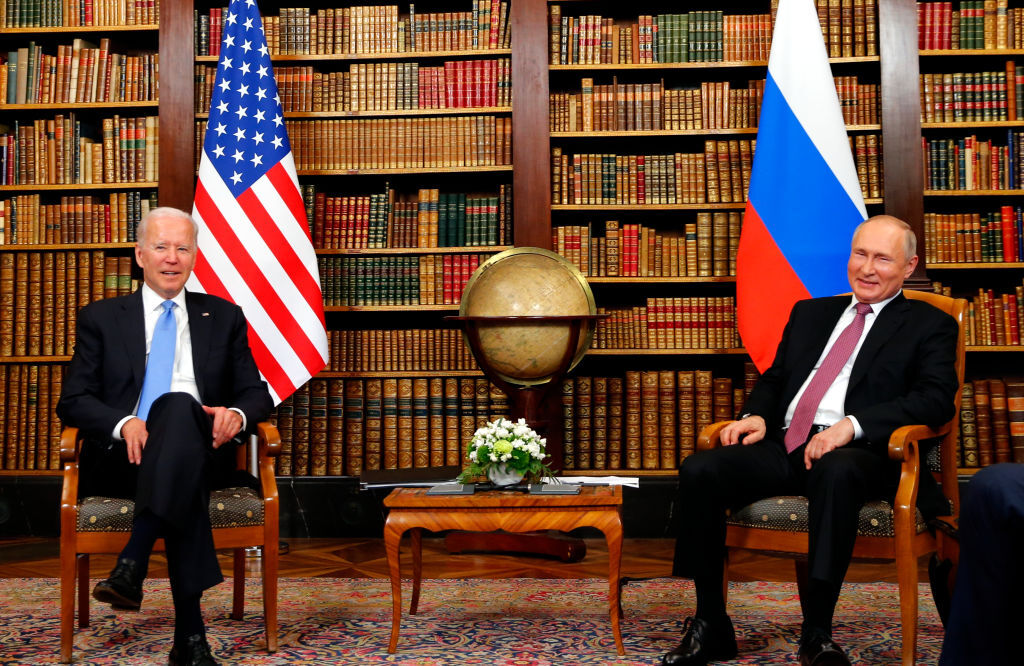Inside Biden's call with Putin


A free daily email with the biggest news stories of the day – and the best features from TheWeek.com
You are now subscribed
Your newsletter sign-up was successful
President Biden and Russian President Vladimir Putin spoke one-on-one Tuesday morning regarding tensions between the Kremlin and Ukraine, a "high-stakes diplomatic effort" by the U.S. at deterring Russia from invading Kyiv. Though exact details of the meeting have yet to emerge (if they do at all), here's what we know about what went down:
As for the conference's kick off, CBS News' Ed O'Keefe shared a video broadcast from Russian state television showing Biden and Putin kindly greeting one another as the bilat began.
Just don't think the two leaders were waving hi to one another over Zoom, reports The New York Times. Instead, Biden relied on his administration's "secure communications process" to get through to Russia, a system with protocol that often varies from White House to White House. A secure call essentially means the resulting conversation is encrypted.
The Week
Escape your echo chamber. Get the facts behind the news, plus analysis from multiple perspectives.

Sign up for The Week's Free Newsletters
From our morning news briefing to a weekly Good News Newsletter, get the best of The Week delivered directly to your inbox.
From our morning news briefing to a weekly Good News Newsletter, get the best of The Week delivered directly to your inbox.
Biden appeared alone on screen in the White House's Situation Room, but it is "common practice" to have aides listening in nearby, with a note taker present also present to piece to together an accurate account of the call. In this case, reports the Times, a translator would likely be in attendance, as well.
All in all, the two leaders spoke for two hours and one minute, according to the White House. An official readout of the meeting says Biden used the bilat to voice "deep concerns" about Putin's escalation of forces around Ukraine, and make "clear that the U.S. and our allies would respond with strong economic and other measures in the event of military escalation." The presidents also discussed strategic stability, ransomware, and "joint work on regional issues such as Iran."
A free daily email with the biggest news stories of the day – and the best features from TheWeek.com
Brigid Kennedy worked at The Week from 2021 to 2023 as a staff writer, junior editor and then story editor, with an interest in U.S. politics, the economy and the music industry.
-
 What to know before filing your own taxes for the first time
What to know before filing your own taxes for the first timethe explainer Tackle this financial milestone with confidence
-
 The biggest box office flops of the 21st century
The biggest box office flops of the 21st centuryin depth Unnecessary remakes and turgid, expensive CGI-fests highlight this list of these most notorious box-office losers
-
 What are the best investments for beginners?
What are the best investments for beginners?The Explainer Stocks and ETFs and bonds, oh my
-
 What is ‘Arctic Sentry’ and will it deter Russia and China?
What is ‘Arctic Sentry’ and will it deter Russia and China?Today’s Big Question Nato considers joint operation and intelligence sharing in Arctic region, in face of Trump’s threats to seize Greenland for ‘protection’
-
 What would a UK deployment to Ukraine look like?
What would a UK deployment to Ukraine look like?Today's Big Question Security agreement commits British and French forces in event of ceasefire
-
 Did Trump just end the US-Europe alliance?
Did Trump just end the US-Europe alliance?Today's Big Question New US national security policy drops ‘grenade’ on Europe and should serve as ‘the mother of all wake-up calls’
-
 Is conscription the answer to Europe’s security woes?
Is conscription the answer to Europe’s security woes?Today's Big Question How best to boost troop numbers to deal with Russian threat is ‘prompting fierce and soul-searching debates’
-
 Trump peace deal: an offer Zelenskyy can’t refuse?
Trump peace deal: an offer Zelenskyy can’t refuse?Today’s Big Question ‘Unpalatable’ US plan may strengthen embattled Ukrainian president at home
-
 Vladimir Putin’s ‘nuclear tsunami’ missile
Vladimir Putin’s ‘nuclear tsunami’ missileThe Explainer Russian president has boasted that there is no way to intercept the new weapon
-
 The Baltic ‘bog belt’ plan to protect Europe from Russia
The Baltic ‘bog belt’ plan to protect Europe from RussiaUnder the Radar Reviving lost wetland on Nato’s eastern flank would fuse ‘two European priorities that increasingly compete for attention and funding: defence and climate’
-
 How should Nato respond to Putin’s incursions?
How should Nato respond to Putin’s incursions?Today’s big question Russia has breached Nato airspace regularly this month, and nations are primed to respond
